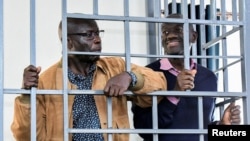Human rights activists, lawyers and medical practitioners in East Africa called on the Ugandan government Tuesday to release opposition leader Kizza Besigye, who has spent the past three months in military detention.
Besigye, who was abducted while on a trip to Kenya in November, was recently rushed to a hospital after going on a hunger strike to protest his imprisonment.
Reading a statement on behalf of 12 organizations in Nairobi, the head of one of the groups, Khalid Hussein, said they condemn the militarization of justice and escalating government repression in Uganda.
“We call on Ugandan authorities to immediately release Kizza Besigye, Hajj Obeid Lutale, Eron Kiiza and others unlawfully detained,” Hussein said. “The abduction and rendition of Kizza Besigye and Hajj Obeid Lutale blatantly violated international human rights law and the principles of extradition treaties.”
A politician who ran against Ugandan President Yoweri Museveni in three elections, Besigye was abducted by unidentified men while on a visit to Kenya in November and taken to Luzira Maximum Security Prison in the Ugandan capital, Kampala.
He appeared before a military court, where former Kenyan justice minister and lawyer Martha Karua defended him. He is charged with treason, illegal possession of a firearm and threatening national security.
Last week, the 68-year-old fell ill and was taken to a hospital after going on a hunger strike to protest his arrest and the charges.
Ugandan lawyer Andrew Karamagi said the treatment of Besigye and other Museveni critics exposes ongoing rights violations in his country.
“The medical union has spoken out and given a scientific medical analysis of Dr. Besigye's health, which is in serious jeopardy,” he said. “Citizens who have attempted to protest this have as well been detained, and I should add, violently arrested, as some of you might have seen. This is a culmination of years of human rights abuses [and] disregard for the constitution.”
On Jan. 31, the Ugandan Supreme Court ruled that the trial of civilians in a military court is unconstitutional and that such cases must be transferred to ordinary courts. But the government rejected the ruling, saying such trials protect the country from criminals.
In a statement posted on X, Museveni called on those demanding the release of Besigye to instead demand a quick trial to establish the facts. Otherwise, he said, such demands promote insecurity, which is dangerous for the country.
Amnesty International East African regional researcher Roland Ebole said a united voice against human rights violations can help end abuses.
“We are having cross-border repression,” Ebole said. “We are having a transnational repression where we are seeing abductions happening beyond borders. And these abductions are happening sanctioned or blessed by presidents, blessed by heads of state. And they are taking advantage of the fact that on the ground, we are not as united against them.”
Rights groups say they will circulate petitions and reach out to other nations and organizations to demand the release of unlawfully detained Ugandans.
The 12 organizations that took part in today’s demonstration have called for people to join a march on Friday to the Ugandan embassy in Nairobi and the parliament building to present a petition for justice and the release of Besigye and those detained alongside him.
